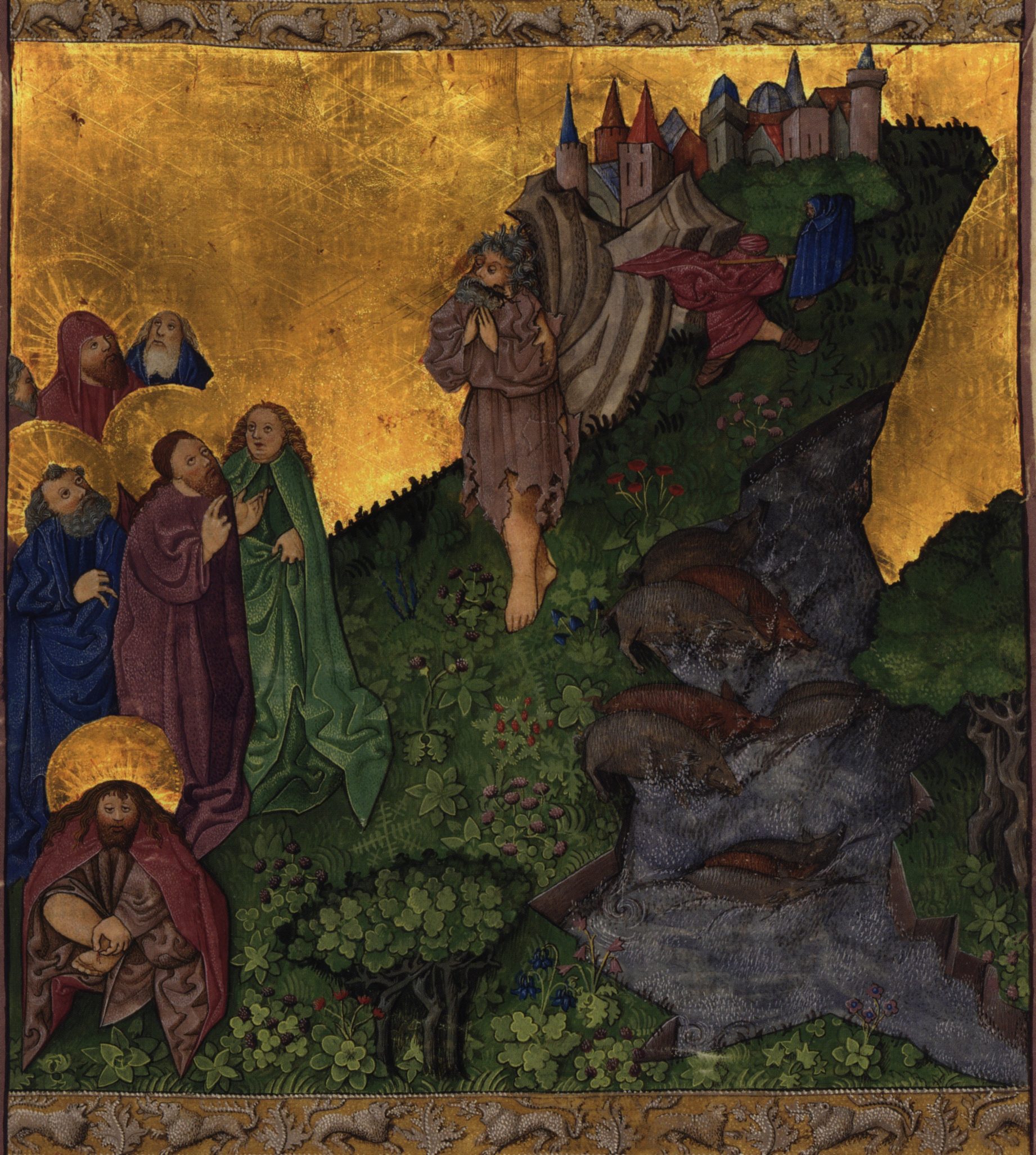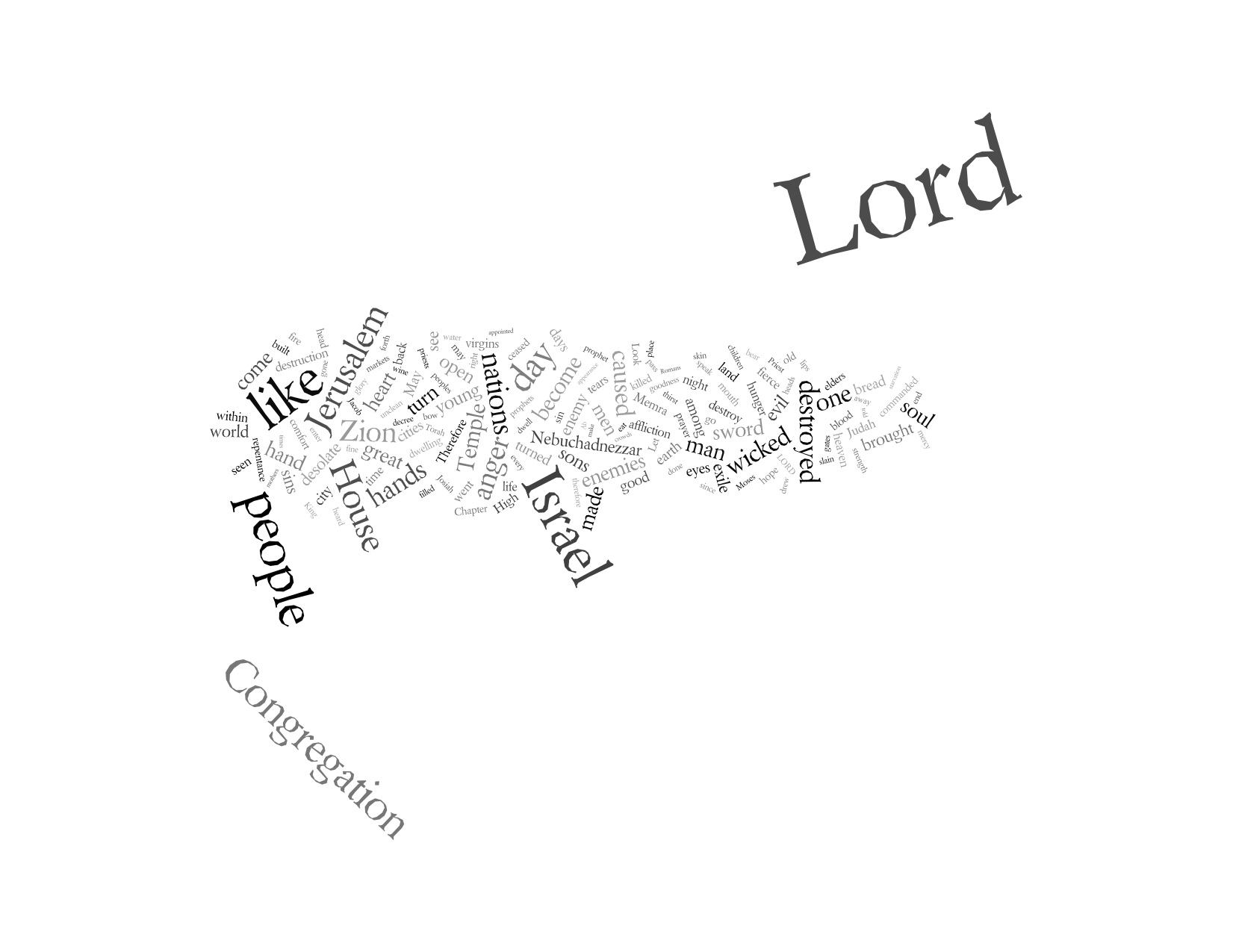Proper 7 (12) (June 23, 2019), Good Shepherd, Lexington.
- 1 Kings 19:1-4, (5-7), 8-15a
- Psalm 42 and 43
- Galatians 3:23-29
- Luke 8:26-39
19:11 [God] said [to Elijah], “Go out and stand on the mountain before the LORD, for the LORD is about to pass by.” Now there was a great wind, so strong that it was splitting mountains and breaking rocks in pieces before the LORD, but the LORD was not in the wind; and after the wind an earthquake, but the LORD was not in the earthquake;12 and after the earthquake a fire, but the LORD was not in the fire; and after the fire … a sound of sheer silence.
1 Kings 19
[silence]
Being quiet is one of the hardest things for me to do. To sit still, not just in silence, but to literally quiet myself, stop myself from moving, calm my thoughts (or more accurately, allow the Spirit to calm them), and to just be. In silence. I don’t think I am alone in this. My whole life I have heard how busy our society is, how our culture is constantly trying to keep us moving and engaged, from one TV show or movie to the next, from one new trendy shop to another, and this was all before the advent of 24 hour news stations, the internet, and our ubiquitous handheld devices.
To be quiet. To be still…
Today, we seek to counter it by talking about “mindfulness” and meditation, as if they were the newest product from a pharmaceutical company. In fact, they are not new techniques and disciplines and are incredibly useful and import to our health. We all need to learn to be more quiet, more still, to get away from the rush and rhythm of the world around us and regroup.
Jesus did this often, he was always going “out into the wilderness.” In those days, of course it didn’t take long and he didn’t have to go far. But it was still something he did, something he needed to do. In our human arrogance of always thinking that NOW is the most advanced and sophisticated society we tend to look back romantically at times past and think how much “simpler and more wholesome it was then.” Yet in the first century Judaea, that is two thousand years ago for those of you keeping track, life was hectic enough and demanding enough that people needed to “get away from it all.”
At all times in history, where ever we have society, we have the pressures of family expectations, the need to work in order to provide for our basic needs (whether that is bread or broadband), and just the general noise of life. And we need to step away from that, from time to time.
I am just not very good at that. I like to keep busy. Sometimes I tell myself that is just the way I am wired, that I need to keep busy. But I am lying to myself. I am hurting myself. So sometimes the quiet is thrust upon us and we are uncomfortable with it. We don’t know what to do in it. The silence can make us afraid.
But in the silence we find God.
In our readings from the Old Testament and the Gospel we find two men who are out in the wilderness, not because they want to be there, but because they had no choice. In the case of Elijah, he had been doing the work of the Lord and, as a result, the queen Jezebel, yes, that Jezebel, wanted to kill Elijah. She had reason. In the previous chapter Elijah, the prophet of the Lord God, had challenged 450 prophets of Baal, who was the god that Jezebel worshipped, to a sacrificial showdown. In the ninth century BCE (that is almost 3,000 years ago, for those keeping score), King Ahab and his wife Jezebel had been leading Israel away from worshiping the Lord to worship the god Baal and the goddess Asherah.
So God sent Elijah to try and convince the king and queen, as well as the rest of the country, that they should return to the Lord. Instead, Jezebel ordered all those who followed the Lord God to be killed. Elijah alone was left and God sent him one more time to challenge the prophets of Baal to the Sacrificial Smackdown of All Time. An incredible story cut short: the Lord won, the prophets of Baal were killed by the sword, and Jezebel declared she would have her revenge on Elijah so he ran away, into the wilderness. You can understand why he said, “It is enough; now, O Lord, take away my life.”
God did not take his life but provided for him him as he went further into the wilderness and up Mount Horeb. There, “the word of the LORD came to him, saying, ‘What are you doing here, Elijah?’” This is before all the earthquakes and fire, this is while Elijah is resting, the night he finally arrived, exhausted and in the dark of the night, God asks, “What are you doing here?”
God knows. God knows what has driven Elijah to run away, out into the wilderness, up the mountain, to just give up and say, “take away my life!” God knows. But does Elijah really know why he is there?
In therapy and business planning this is called, among other things, “stock taking” or “restating the mission.” We can get so busy, so focused on the running, that we forget where we are running to or what we are running from or why we were running in the first place. In the still, darkness of the night, Elijah has to answer the question, “Why am I here?”
The question is repeated again, but this time it is not the word of the Lord, that voice that comes to us in darkness that asks him, but the Lord himself who passes by. As frightening and awe-some as God is, remember on Pentecost, I spoke about God in the fire and smoke, the thunder and lightening?, God is most present and speaks most clearly in the silence. Elijah hears God and answers again, “I have been very zealous for the Lord, the God of hosts; for the Israelites have forsaken your covenant, thrown down your altars, and killed your prophets with the sword. I alone am left, and they are seeking my life, to take it away.”
Elijah restates his priorities, that he has been committed to God, declaring God’s covenant and love for his people, and what he has received in return is to be threatened with death. He is here, standing on the mount of God, because he is committed to the Lord and unwilling to bow down to any other gods. He continued to stand up for what was right and holy and for that, they wanted to kill him. And God’s response was: “Go, return on your way” and continue your ministry, continue your work of being my spokesman, my prophet.
Elijah was not being let off the hook, God was not taking his life, as Elijah had asked, but sending him back out into the world to continue to do the work of God. BUT in that lonely place of quiet and solitude, Elijah had seen and heard God’s voice.

In the Gospel, we find the man of Gerasene, he had been possessed by demons and had been chained and locked up and was living among the tombs so that he would not hurt himself or others. Even then, his possession was so strong, that he would break the chains and run out into the wilderness, away from the city, away from civilization. Rather than climbing a holy mountain, the man came to Jesus and the demons who had controlled him and tormented him recognized that here was the “Son of the Most High God.” Jesus, showing mercy to both man and demons, releases the man from his torment and sits down and teaches him.
The people of the region come out to see what had happened to the man (and the swine). “When they came to Jesus, they found the man from whom the demons had gone sitting at the feet of Jesus, clothed and in his right mind. And they were afraid.”
These people came out to the wilderness to see a freak show. They came out because they were angry: Jesus had deprived the swine-herders of a profit. They came out to see a fight. They came out to see a spectacle … what they saw was spectacular. They were not seeking God, yet they found God and their response…was to send him away because they were afraid.
Elijah and the Gerasene man were afraid when they went out to the wilderness, but there they found God. They entered into the quiet places, the silence, among the mountains and the tombs, and God met them there. God spoke to them, God gave them strength, and then God sent them out again.
8:38 The man from whom the demons had gone begged that he might be with him; but Jesus sent him away, saying, 39 “Return to your home, and declare how much God has done for you.” So he went away, proclaiming throughout the city how much Jesus had done for him.
We must go to the silent places, to the wilderness, whether internal and external, and be quiet, reflecting, waiting and listening for God. We may go out in anxiety, stress, or fear, but once there we will be met by God. Grace is waiting for us in the stillness of the wilderness. In his grace, Jesus will give us new life, new strength, he will feed us with a spiritual food that will nourish and give us strength for the journey ahead, and then God sends us out again, to declare how much God has done for us.
T’was Grace that taught my heart to fear
And Grace, my fears relieved
How precious did that grace appear
The hour I first believed






One thought on ““Declare what God has done for you.””
“But in the silence we find God.”
!!!!!!!